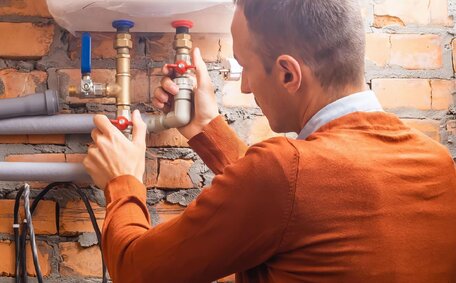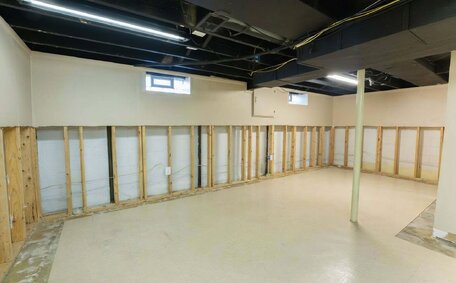Understanding the dangers of gas leaks
Gas leaks present a critical safety risk in homes and demand prompt attention. Undetected natural gas leaks can lead to dangerous gas buildup and increase the risk of fire, explosion, carbon monoxide poisoning, and other health problems. Identifying symptoms like headaches, nausea, dizziness, and fatigue is crucial for detecting natural gas LPG leaks and ensuring safety.
Extended exposure to gas leaks can lead to severe health risks, potentially fatal.
Propane and natural gas behave differently when leaked. All LPG leaks are hazardous and pose significant safety risks.
While both gases displace oxygen, propane, being heavier than air, can settle in low spaces, creating a risk of gas accumulation your family must be aware of, whereas natural gas, lighter than air, tends to rise. Ashfield Plumbing, with its expertise, can handle emergencies involving combustible gas leaks, like those from natural gas or LPG.
Early detection of gas leaks is essential to effectively manage such incidents.
Conduct regular inspections of your gas appliances and lines to locate leaks early. Be attentive, and if you smell rotten eggs, often indicative of a gas leak, consider it a call to action to detect leaks effectively. If you suspect a gas leak house, evacuate the area, call 000, and reach out to a professional immediately. When it comes to gas safety for your home or business, it’s always better to err on the side of caution.
Recognizing the signs of a gas leak
A prominent sign of a gas leak, which calls for professional assistance, is the smell of rotten eggs. Gas companies intentionally add a sulphur-like odorant called mercaptan for easy detectability. If you can smell gas, often described as rotten eggs or sulphur around your home or gas appliances, it likely indicates a gas leak.
Listen for hissing or whistling sounds from your gas stove or appliances—a sign that a gas leak might be present.
Visible Signs
Look out for white clouds or mist near gas lines or appliances, which could signal an escaping natural gas or propane leak. Additionally, check for dead or dying vegetation around gas line areas, as natural gas propane leaks can displace gas air causing plants to die.
If you notice any of these smell, sound or sight indicators around gas equipment, take action immediately. Evacuate the area, call 000 for emergency services, and contact a professional gas plumber like Ashfield Plumbing to inspect your home.
Smell
Gas is naturally invisible and odourless, hence a rotten egg scent is added by companies for easy detection. If you detect this distinct sulphur or rotten egg smell anywhere in your home, it’s important to consider where gas is used and check those areas as it likely signals a dangerous gas leak.
Remain vigilant, particularly when checking kitchen gas equipment, if this smell appears, even intermittently. Examine areas near the stove, water heater, furnace, fireplace, and outdoor gas meters for unusual odours. Examine areas near the stove, water heater, furnace, fireplace, and outdoor gas meters for unusual odours.
A faint rotten egg odour can serve as an early warning before gas concentrations reach explosive levels.
Trust your sense of smell – it could be a lifesaver.
So if something smells funny, play it safe and get your gas lines inspected right away before assuming all is fine.
Sounds
In addition to the distinct rotten egg smell, listen for any unusual hissing or whistling noises from your gas appliances or pipes. This sound is caused by natural gas escaping through leaks at high pressure. Gas makes noise when it leaks, so perk up your ears, especially near the stove, water heater, and gas meter.
A high-pitched hissing or whistling sound near gas appliances, including stoves, may indicate a gas leak. Evacuate everyone from the building, leave the doors open on your way out, and call 000 once at a safe location away from the gas. Keep everyone out of the home until emergency crews arrive to handle the leak and declare your property safe again.
If you notice such sounds, address the issue promptly to avoid danger.
Unusual noises require immediate attention as they might indicate gas leaks in your home. Don’t take chances - protect yourself and your family by contacting the gas leak detection experts at Ashfield Plumbing at the first sign of auditory or olfactory trouble. We have the tools and experience to identify leaks fast and make all necessary repairs.
Visible signs
In addition to smell and sound, visually inspect areas near gas appliances and lines. Look for any white misty clouds, fog, bubbles in standing water, or dead vegetation when you suspect a leak. This happens because gas leakage can displace oxygen, resulting in dead plants nearby despite adequate moisture.
Pay attention for dying plants and trees or white vapour clouds around gas equipment. Although rarer than scent alerts, visual signs must still be taken seriously.
The gas concentration may be building to hazardous levels, so don’t wait if you notice anything unusual. Take safety precautions, evacuate everyone until emergency crews containing specialised gas leak detection tools declare the area safe.
Detecting gas leaks in your home
Conduct a soapy water test
Before seeking professional help, perform a soapy water test to check for leaks as an initial step.
- Ensure all gas appliances are switched off in the event of a suspected gas leak.
- Mix a couple drops of dish soap into a spray bottle filled with water.
- Spray or brush the soapy solution onto the gas connections, joints, valves and fittings on appliances like your stove, water heater and dryer.
- Carefully check for bubbles formation - they signify gas escaping, indicating a leak.
If the soapy water test shows a leak, shut off your main gas supply at once and call Ashfield Plumbing for expert help.
Install gas leak detectors
Install an economical gas detector in critical areas at home for added vigilance. Position them near gas appliances in furnace rooms, kitchens, basements and sleeping areas for the most effective leak detection.
Whilst handy for monitoring air quality when you use gas, detectors and alarms should not replace regular manual inspections. Make a habit of using your nose as a natural gas leak detector, sniffing for rotten egg odours and listening for hissing noises around gas equipment.
Don’t delay - call the experts
If you detect a gas leak, turn off appliances immediately, evacuate, and call Ashfield Plumbing 24/7 on 1300 349 338. Our licenced technicians have advanced detection equipment to identify the source leak and make your home safe again.
Do not overlook potential gas leak signs and be aware of the necessary actions to take in such events. Leave it to the professionals - your life may depend on it.
Responding to a gas leak
Evacuate immediately
If you detect a gas leak odour or suspect a leak, evacuate immediately and ensure all your gas appliances are secure. Do not turn any electrical switches on or off, as an electric spark could ignite leaking gas. Avoid using phones or devices in the area and do not smoke or light matches either.
Turn off the gas supply
After evacuating to a safe location away from the gas, shut off the main gas supply valve on the gas metre outside or inside your home, Knowing how to do this safely is essential. This action will halt the flow of gas in your house and limit further leakage while help is on the way.
Ventilate the area
Open all doors and windows to ventilate the property when gas is suspected. This action aids in dissipating any built up gas, highlighting the importance of effective gas detection. Do not re-enter the home until emergency services declare it safe to do so.
Call for professional help
From your evacuation meeting point, call 000 immediately to request emergency assistance. Once emergency crews are notified, contact Ashfield Plumbing on 1300 349 338 - our highly trained technicians can help respond rapidly to gas leak calls and have advanced leak detection equipment to identify the source of the leak and make necessary repairs.
Do not attempt to fix a gas leak on your own. For fast, 24-hour gas leak response and certified repairs, call your local experts at Ashfield Plumbing by phone or book an inspection online today.
Preventing gas leaks
Inspect appliances and connections
Regular inspections are fundamental in preventing gas leaks. Visually check appliances like your stove, hot water system, your AC, and heater for signs of wear or damage. Conduct occasional soapy water tests on gas pipes and fittings to detect potential leaks, which might otherwise manifest as increased gas bills. Watch for corrosion as it may cause gas leaks over time. Having appliances serviced yearly not only detects issues before they turn dangerous but can also help in preventing higher gas bills.
Fix leaks as soon as possible
If you discover a leak through smell, sound or bubbles with the soapy test, address it immediately. Turn off gas valves and call a professional like Ashfield Plumbing straight away. Address leak repairs promptly, regardless of their size, to prevent problems from worsening.
Install gas detectors
Consider investing in natural gas detectors, carbon monoxide alarms, or combination units for extra leak alert protection. Position them appropriately around appliances and plumbing lines. Units equipped with alarms bring attention to accumulating gas before it turns hazardous.
Choose qualified gas fitters
Always engage a certified gas fitter to install, connect, inspect, or repair your gas systems. Trust unqualified DIY work risks leaks. Our skilled team at Ashfield Plumbing hold Master Gas Licences to ensure work meets strict industry safety standards.
Make gas safety a priority in your Sydney home. Stop by our Ashfield office or call our 24/7 hotline on 1300 349 338 to discuss gas leak prevention measures.






